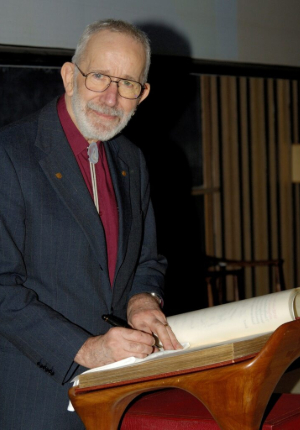Advancing accessible science for low-vision and diverse-needs communities | Cell
Net Zero Commission leaders appointed in NSW | The Mandarin (paywall)
RNA 'blueprint' kicks off national effort | Innovation Aus (paywall)
The geneticist who uses science to free parents wrongly convicted of killing their children | Nature
Black, White, and what next? A case for reconciliation after the Voice Referendum | ABC Listen
More good news for Australian of the Year Richard Scolyer who has brain cancer | The Australian (paywall)
At the annual Lindau Nobel Laureate Meetings young scientists meet and mingle with Nobel laureates | The Australian (paywall)
Experts lament Australia’s EU research fund snub | Information Age
The Australian’s 60 most influential people of the past six decades | The Australian (paywall)
11 June 1937 – 23 July 2024

Professor Robin Warren was a pathologist elected to the Academy in 2006 for the discovery of Helicobacter pylori; the bacterium that causes a range of gastric disorders, including peptic ulcers, gastritis and gastric cancer.
Professor Warren was born in Adelaide. He studied medicine at the University of Adelaide, graduating in 1961, and in 1967 he was admitted to the Royal College of Pathologists of Australasia. He then moved to Perth to take up a position as staff specialist in pathology at Royal Perth Hospital (1968–98).
Professor Warren began to work with Professor Barry James Marshall AC FAA FRS in 1981 and together they were able to demonstrate that the bacterium Professor Warren observed (now called H. pylori) was the causative agent in peptic ulcers.
The two researchers persisted in the face of scepticism and setbacks, demonstrating how H. pylori was able to survive in stomach acid. In 1982, the pair proved that patients could only be cured if H. pylori was eliminated.
Reflecting on their joint discovery, Professor Warren said “Barry came into my room one day and suggested to me, ‘I think we’re onto something really good, we could even get a Nobel Prize out of this’. I said to him, ‘Don’t be so bloody stupid’.”
Their research resulted in effective treatments for a variety of gastric ailments, sparing thousands of people world-wide a lifetime of pain and distress.
In 2005, Professor Warren and Professor Marshall were jointly awarded the Nobel Prize in Physiology or Medicine for their work.
Professor Warren received the Australian Medical Association (AMA): Medical Research Award (1995), the inaugural Florey Medal (jointly with Professor Marshall, 1998) and the AMA Gold Medal (2006). He received an Honorary Doctor of the University of Adelaide (2006). In 2007 Professor Warren was named a Hall of Fame Inductee in the WA premier’s Science Awards and appointed a Companion of the Order of Australia (AC). He was also a Bragg Fellow of the Royal Institution of Australia.
The University of Western Australia renamed its medical library the J. Robin Warren Library in 2017, in recognition of his contributions to medical research and as an inspiration to future generations of students.
In 2015, Professor Warren joined 70 Nobel Laureates at the 65th Lindau Nobel Laureates meeting in Germany to exchange ideas with and inspire young scientists from around the globe.
He was interviewed by Norman Swan in 2008, about his childhood, family, Nobel Prize winning research and his love for photography.
© 2025 Australian Academy of Science